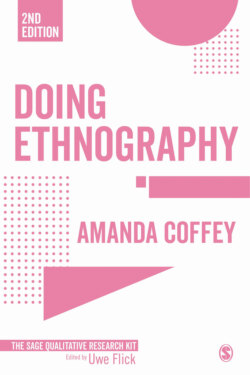Читать книгу Doing Ethnography - Amanda Coffey - Страница 23
На сайте Литреса книга снята с продажи.
Fields of study and developing research questions
ОглавлениеAll research starts with a problem or an issue to be explored and investigated. While ethnographic research draws on an understanding of developing ideas and theory through the systematic collection and analysis of data, it is still possible and indeed desirable to develop the problem a little before beginning the research proper. This can be done through engagement with existing data on or knowledge about the setting or comparable settings, exploring relevant or related literatures for concepts and phenomena that might be useful entrées into the setting, or starting from ‘known facts’ or ‘assumed understandings’ about a setting or phenomenon in order to generate ‘how’ and ‘what’ questions. Foreshadowing problems, issues or questions for exploration can provide the researcher with a practical way into a setting, from which ideas about how to explore and describe the setting might flow.
In ethnographic research it is usual to refer to the setting of investigation as the ‘field’ and the data collection undertaken as fieldwork. A field of study might refer to a physical location or institutional setting, but also to social or cultural space – a site in which and through which research is carried out – a particular organization such as a hospital, or school, or nightclub, or a public space such as the park, or train station or beach. And fieldwork here refers to the act of immersion in that setting, of ‘doing’ ethnography as an act of practice. Ethnographic research can be articulated in broader terms however, and it is possible to conduct excellent ethnographic research without immersion in a field of study – for example, by applying ethnographic principles to research activities that might include a series of conversations and encounters with social actors. Here the field might be the site from which the social actors come, and through them be the site of exploration – for example, a series of ethnographic conversations with midwives in order to understand midwifery practice, or listening to and conversing with teachers in the staffroom of a school in order to make sense of teachers’ lives and selves in and out of school.
When a field of study is identified, pre-fieldwork practices or preliminary fieldwork can help to develop research questions and possible lines of inquiry. So, for example, undertaking some initial scoping research on the setting can often be possible and helpful. Collecting documents (see Rapley, 2018) in and of a setting can provide insights into the documentary realities of that setting, providing one way or indeed often multiple ways of ‘seeing’ and ‘reading’ a setting. Informal conversations and discussions, including exploring opportunities for access, might be possible, as might initial visits, some preliminary observation or the collection of visual images or sounds of the setting. Such activities actually mark the start of the research but can be usefully conceptualized as an initial or preliminary stage, enabling a more nuanced and focused research design to be developed, with the potential to scope out a range of lines of inquiry.
The field of study and research questions can also be developed out of our own interests and experiences, and completely legitimately so. A setting might well present itself in and through a personal experience. For example, there is a rich ethnographic tradition of teachers drawing on their experiences in undertaking school ethnographies (see Gordon et al., 2001, for an overview of ethnographic research in educational settings); equally, a number of sociologists have used their experiences of illness and health care settings to develop ethnographic analysis and insight on medical encounters and the body (see Beynon, 1987; Delamont, 1987; Horlick-Jones, 2011). The important thing here is that these personal experiences provide stimuli to engage ethnographically and reflexively with a field of study. They provide a way into and some important anchors for asking questions about the nature of experience and process. Indeed all ethnographic research builds on the resource of personal experience; by its very nature doing ethnography demands that the researcher is ‘there’ and, through personal engagement with the field, progressively focusing inquiry in order to develop rich descriptions and make sense of the field of study. So our personal interests and insights, to an extent at least, always guide our fieldwork practice, whether that be the stimuli for an initial interest in a topic or field of study, or through our personal reflections and experiences that enable fieldwork to become fine-tuned and detailed. The role of the ethnographic researcher in shaping and asking the questions, and in providing critical reflection is key. This does not assume a personalized, narcissistic or inward-facing research agenda. While the personal is intrinsic to the ethnographic project, it is important to acknowledge and question our own subjectivities and positionalities, drawing on but not being limited by our personal interests and questions.
